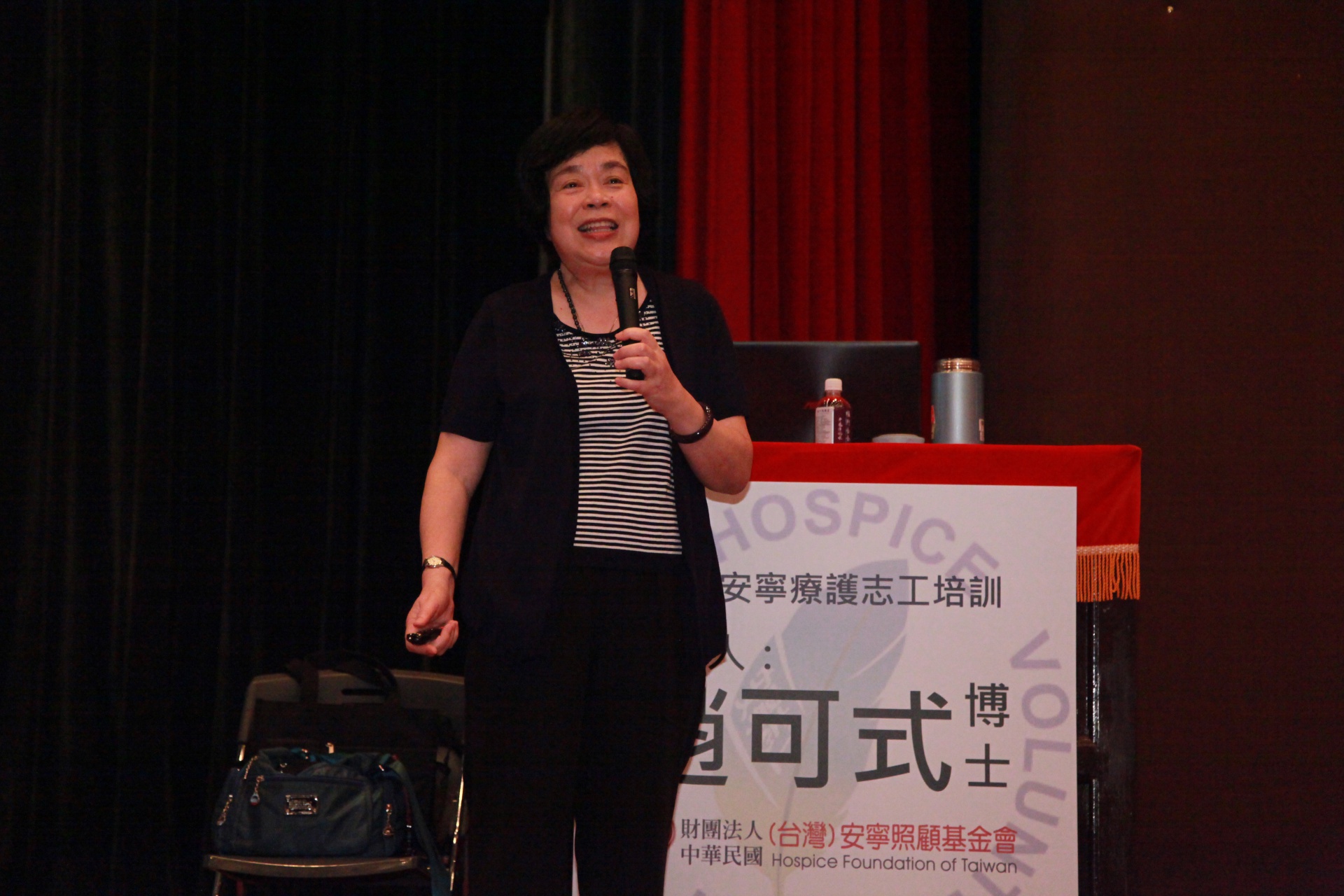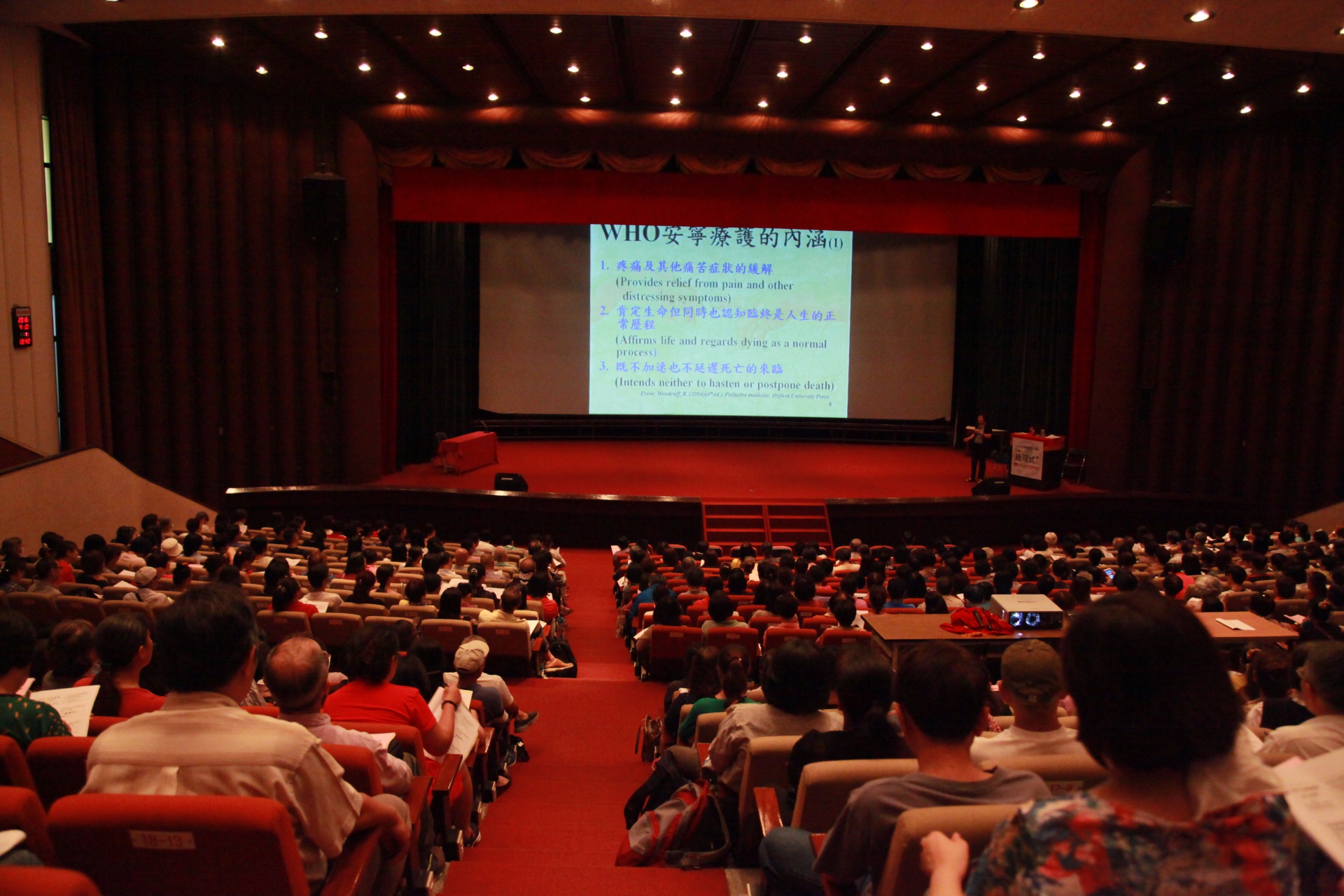
Hospice Foundation of Taiwan has unprecedentedly hosted the “2016 Palliative Volunteers Training Lectures” in the entire nation of Taiwan. These lectures were given by “the mother of palliative care of Taiwan” Prof. Chantal Co-shi Chao.
Her first lecture invited all volunteers and people who were interested in palliative care in northern Taiwan to gather at the Taipei Veterans General Hospital. Prof. Chao spoke of a reporter, who had previously asked her if palliative care means no treatment at all and if patients only take excessive amounts of morphine only to move into and remain in the palliative care ward. Prof. Chao then asked the reporter further about her resource, and the reporter replied that she learned it from a senior palliative volunteer.
Even volunteers with years of service don’t really understand palliative care
Such remarks as from the reporter have shocked Prof. Chao, who has been dedicating herself to palliative care development in Taiwan for more than thirty years. Prof. Chao realizes that not only non-palliative professionals lack palliative knowledge, but also the volunteers who have been providing services for many years. These misconceptions of palliative care have hindered the general public from knowing their rights of a good end of life. Hence, Prof. Chao has decided to hold these lectures in Taiwan and personally speak and explain palliative care.
The first lectures attracted more than 800 volunteers. There are very few speakers in Taiwan who possess such charisma as she does. Prof. Chao started her lecture with an actual clinical experience of a terminally-ill patient with multiple organs failure; this patient was sent to ICU with many tubes inserted into her body and she noticeably suffered a lot. Prof. Chao couldn’t help but to ask the attending physician if the patient can survive after all the suffering, to which the attending physician replied with an astonishing, "Of course not!"
Prof. Chao then questioned, “If that is the case, why make the patient suffer?”
The attending physician replied confidently, “The responsibility of being a doctor is not to give up on our patients!”
However, Prof. Chao pointed out that this is definitely not a special and unique case. It is enough to notice that even the clinical professionals’ lack of palliative knowledge is led by misconception through this simple conversation.
Break the common myth about palliative care
During her 3.5-hour lecture, Prof. Chao broke the common myth of how the general public usually sees palliative care, and through her decades of experience with terminally-ill patients, she instructed the volunteers how to offer their assistance that fits the patients’ physical, psychological, social and spiritual needs. Prof. Chao suggests people to provide themselves to the patients and to their family members during this difficult time. She notes that besides having a zealous heart, there are also clinical norms and requirements that need to be followed.
Prof. Chao stressed that volunteering service is a “sincere activity” that requires sensitivity and empathy for terminally-ill patients and their family members as they walk through this valley of the shadow of death. Patients and volunteers must provide their naked selves to each other without any disguises and build up relationships with mutual trust, interdependence, and understanding. Besides physical, psychological, and spiritual care, terminally-ill patients often require religious support as well. Many volunteers who devoted themselves to palliative care are often motivated by their own firm and strong faith. But while providing their time and service, volunteers need to get rid of their own religious convictions in making condescending judgments or comments.
Avoidable clinical mistakes
Prof. Chao also reminded the audience how many volunteers come with an eager heart, but forget the utmost prerequisite, which is to consult the attending nurse if there are any precautions to be aware of as they assist the patients. There have been some irreversible mistakes that should not have happened during clinical care. For instance, a volunteer was caring for a terminally-ill patient with costal metastatic and beating suction, yet was unaware of the patient’s condition and ended up causing broken ribs to the patient. Other patients even suffered from aspiration pneumonia just because the volunteers were trying to be helpful by feeding patients food. What may have started with good intentions could actually end up paving the road to an earlier death than is necessary.
Prof. Chao stresses, in order to prevent similar accidents from happening again, a well-planned, comprehensive, orientation training is indispensable. Regrettably, she noticed that some volunteers have the urge to serve, but are not interested in learning more. However, having a passionate heart does not suffice, as having competent knowledge, appropriate skills, and right attitudes are all equally important. At the same time, the core values of medical ethics--autonomy, beneficence, non-maleficence, and respect for human rights--will also need to be observed and followed, so as to assist and ensure quality end-of-life care. Helping patients to practice the “four sayings of life”, i.e., to “say thanks, say sorry, say love and say good-bye” can also be helpful. How to help terminally-ill patients to full and meaningful lives is an ultimate goal that requires continuous efforts, and Prof. Chao anticipates that each trained volunteer will be the most amiable and helpful ambassador of palliative care.

